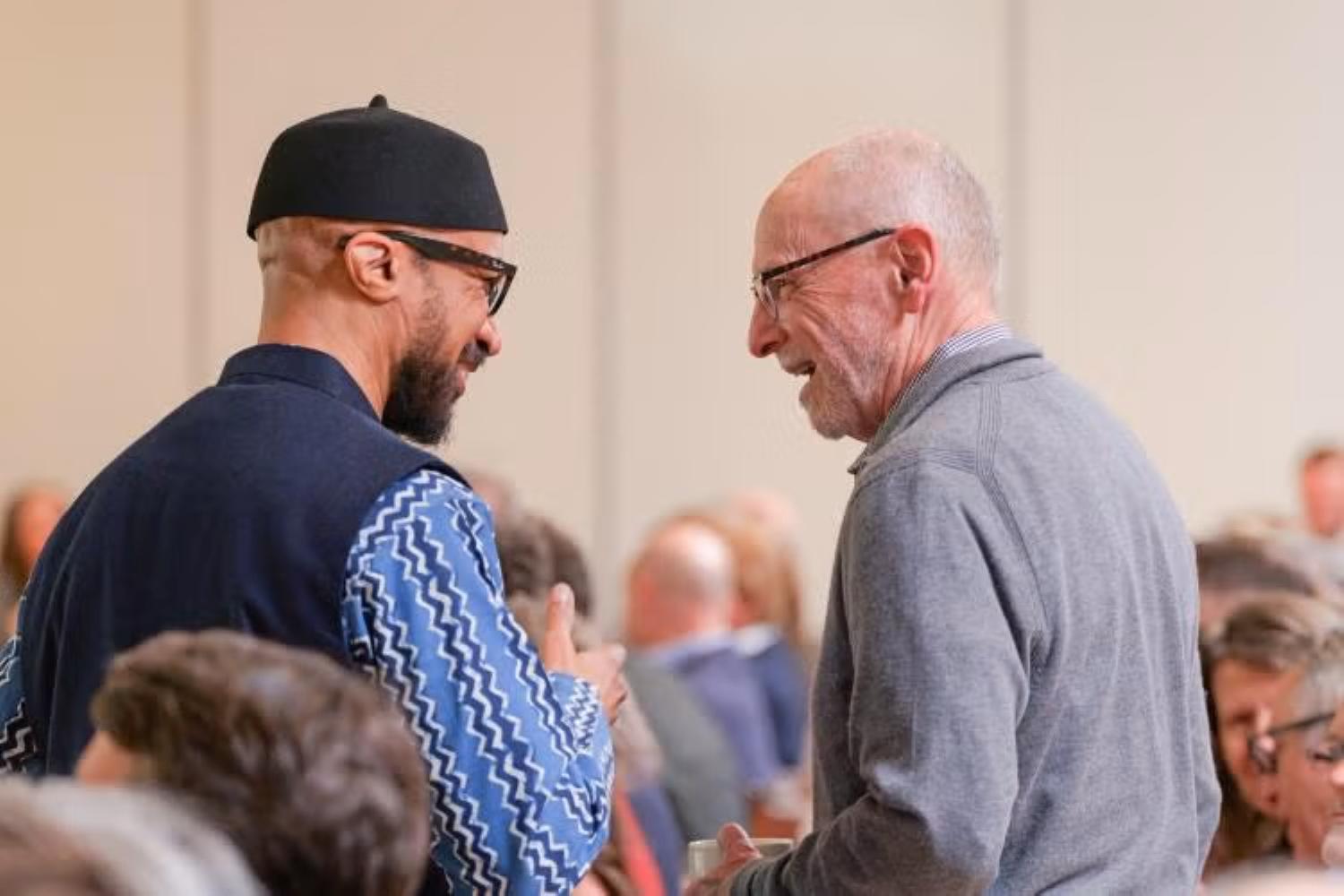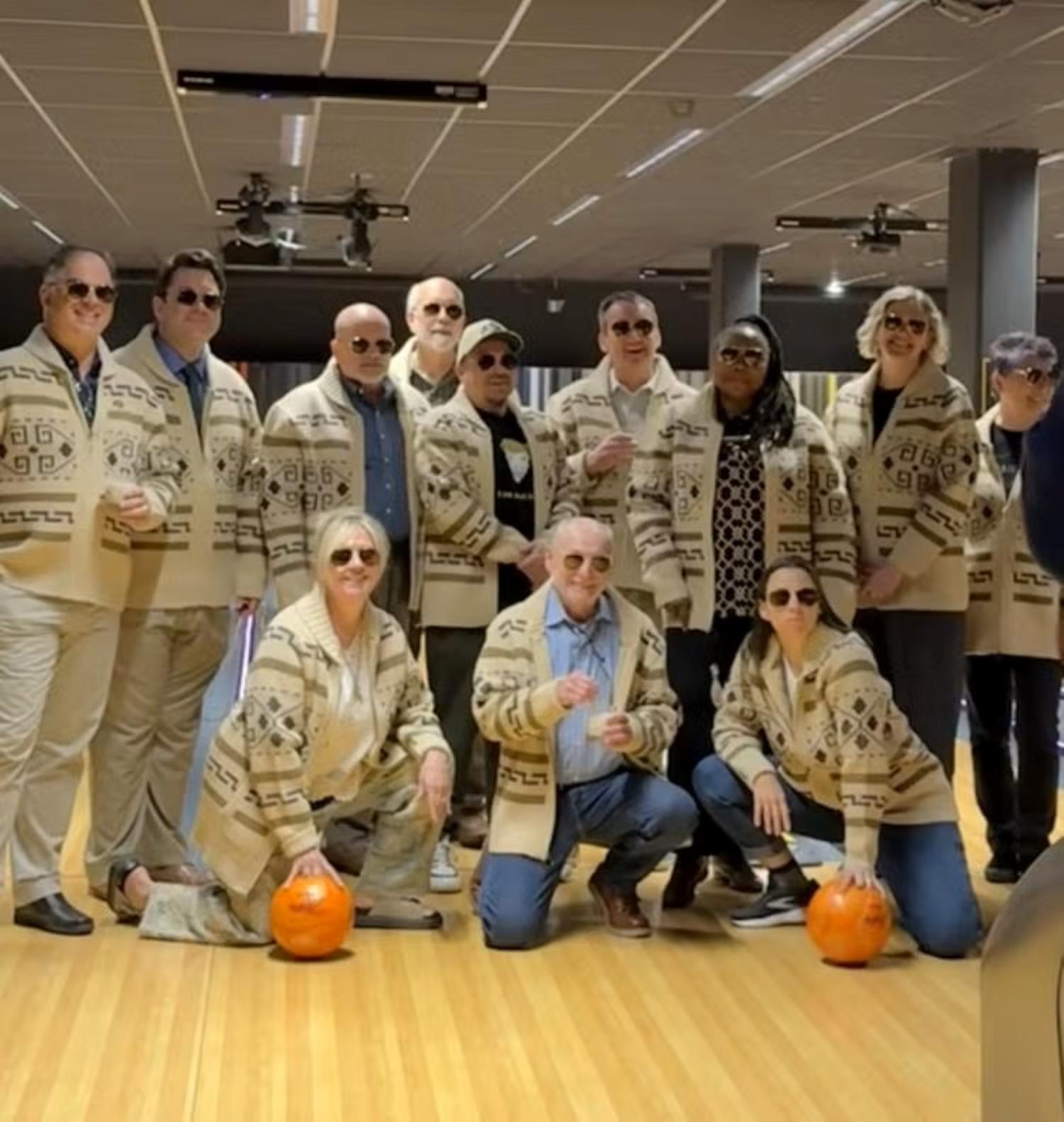How a California dude became CU Boulder’s provost
Before finding the joy of exploration as a university professor and chief academic officer, Russell Moore found it traveling the world
When Russell Moore went to college, the Vietnam War, Kent State killings, Watergate and an energy crisis dominated the nightly news.
Moore was studying biochemistry at the University of California, Davis, and those tumultuous days made academics less than entrancing. “There was so much going on in the world, and as for college, well, I just didn’t see the point,” Moore recalled recently.
Biochemistry seemed “maybe interesting,” but it also seemed mostly focused on process, and the purpose wasn’t clear, Moore said.

Russell Moore (right) talks with Reiland Rabaka (left), director of the Center for African and African American Studies, before the State of the Campus address. (Photo: Glenn Asakawa/CU Boulder)
So after two and a half years of college, he dropped out to travel the world. At the time, his sister was a flight attendant for Pan Am Airways, and he got long-haul tickets “virtually free.” He went to the South Pacific, Southeast Asia, New Zealand and Australia.
Once back in the United States, he got a job but soon realized that “this job thing” also wasn’t compelling. So, he returned to college and began working in a research lab.
“That’s when things changed,” he said. “Then I saw the point.”
He was working in the lab of Irwin Segel, then a professor of biochemistry, who framed the scientific enterprise this way: “When you make a scientific discovery, you know something no one else on the planet knows, even if it’s minuscule and for only a few minutes or hours.”
Segel also told his students that science rarely progresses in large leaps; most of the time, it takes small steps. “I thought that was cool, like I could be part of something that was significant,” Moore said.
“I could see myself in that process, even though I wasn’t the quarterback. I was just a small contributor,” but playing that role got him “very, very interested in the research enterprise.”
After earning his BS in biochemistry from UC Davis, Moore studied physiology and earned a PhD from Washington State University.
Leaving college and returning was not so much a detour in his academic journey as a necessary part of the path. As he puts it, the experience widened his aperture, which helped him realize his eventual role as a university professor and chief academic officer for the University of Colorado Boulder.
Initially, academic life seemed not to offer a foray into the unknown. “What I love about traveling is just a sense of exploration. And part of what I learned about myself is, particularly being in very foreign environments, you don’t have to fear the unknown. You can view it also as an exciting thing.”
Now, he eyes another journey into the unknown. He is about to retire.
From professor to administrator
Today, he is the university’s provost and executive vice chancellor for academic affairs. He has served as provost since 2010 and is a professor of integrative physiology and an adjunct professor in the Department of Medicine at the University of Colorado Anschutz Medical Campus.
Moore was appointed associate vice chancellor for research in 2006 and was named interim vice chancellor for research in 2009. He has taught at CU Boulder since 1993 and served as chair of the Department of Integrative Physiology from 1994 to 2001.

Russell Moore (front center, wearing blue shirt) and CU Boulder deans at a "The Big Lebowski"-themed tribute to Moore at the UMC Connection.
Before the department became dedicated to integrative physiology, it was the department of kinesiology, which had grown out of the university’s physical-education program.
A core group of faculty members launched the move to transform the kinesiology department into a department of physiology. By the early 2000s, CU Boulder’s Department of Integrative Physiology’s graduate program was ranked among the nation’s top 10.
Moore’s lab contributed to that reputation, focusing on the cellular basis for exercise-induced protection of the heart against ischemia-reperfusion injury and on the influences of diet and exercise on cardiac energy metabolism.
Moore said he appreciates the physical-education roots of his department. Paraphrasing an early 20th century physiologist, Moore said you can study a locomotive at rest, disassembling its engine and examining its parts, but that won’t really tell you how it works.
“You need to be able to study the locomotive while it’s moving,” Moore said. “And you can study physiology while I’m sitting in this chair, but I have arms and legs, and they’re not designed for me sitting in the chair. They’re designed for me to run and pick fruit and whatever.”
Studying organisms under stress, as they’re designed to function, is more revealing. Another thing that drew him to physiology is that much scientific research focuses on pathology rather than physiology. “And they’re not necessarily just reverses of each other. They’re two different paths. That just gets back to the exploring part, and that’s what’s fun.”
Similarly, conducting research is a different enterprise than becoming an academic administrator. Moore came to that when he “drew the short straw” and was named chair of his department.
“It was hard, really hard. I think department-chair jobs are the hardest jobs on campus, because if you’re making hard decisions, you’re making them with people whom you know really well,” he said.
“It’s easier to make hard decisions when you’re further removed interpersonally. I always know when I make a tough decision is impacting people. But it’s different when you’re working with peers-slash-friends.”
Moore volunteered for a campus-wide committee with a light workload, the research-misconduct committee, which hadn’t heard a case in years. Within months, allegations arose against Ward Churchill, a former ethnic-studies professor whom the university later fired for plagiarism and academic misconduct. Moore co-chaired the inquiry committee that initially investigated the charges against Churchill.
Churchill was also a controversial figure, calling victims of 9-11 terrorist attacks “little Eichmanns,” a reference to Nazi war criminal Adolf Eichmann.
Responding to a question about why such an initiation into academic administration was compelling, Moore said the experience taught him about research administration and research compliance.
“I didn’t know all of that stuff existed,” he said, adding, “Because I have such an affinity for research and discovery, I got really interested in that.” So he applied to be associate vice chancellor for research.
"You need to be able to study the locomotive while it’s moving. And you can study physiology while I’m sitting in this chair, but I have arms and legs, and they’re not designed for me sitting in the chair. They’re designed for me to run and pick fruit."
This, too, was a natural fit, he said, noting that he’s always loved research and scholarly endeavors on campus, whether they’re in science, arts and humanities, music; “it’s all incredibly interesting to me,” because all these disciplines involve the discovery or creation of things that are novel.
The regular-person leader
Bronson Hilliard, CU Boulder senior director of academic communications, has worked with six university presidents, five campus chancellors and a host of mid- and upper-level administrators in three decades of university service.
“Russ Moore is a complete human being,” Hilliard said. “He’s not only a good administrator; he’s a good human being. He’s brought into the role of being provost an abundant life experience … of erudition and education and training. But Russ adds to all of that a kind of regular-person quality that I’ve not seen in any administrator I’ve ever worked with.”
“He’s very much in touch with the impact of education on real people’s lives,” Hillard said, adding, as an example, that Moore worked to ensure a smooth path for students transferring from community colleges to CU Boulder.
Student success is one of Moore’s passions. As he tells it, in regular meetings with new employees, he’d ask every person a question for which there was, he emphasized, one right answer.
The question: “What’s your job?”
Employees might reply with, “groundskeeper” or “advisor,” for instance.
“The right answer is, ‘I’m here to make students successful,’” Moore observed, adding that Nobel laureates, groundbreaking spinoff companies, startling discoveries about the solar system, soaring musical scores—“we can’t do it without everybody’s contribution.”
Student success, along with knowledge discovery and dissemination, is “why we’re all here.”
Moore, Hillard said, has never lost touch with his roots; he grew up in Northern California, worked as a river-raft guide, enjoys fly fishing, loves to camp and hike and “knows his way around a backyard barbecue grill.”
“Every day I came to work with Russ, I knew I had a real human being at the center of the work,” Hilliard said.
“There’s the stereotype of an ivory tower, and Russ Moore is the antithesis of an ivory tower. If there is a Russ Moore tower, it’s made of very earthy substances, not ivory.”
That relatively unflappable, regular-person quality figures prominently in Moore’s favorite movie, The Big Lebowski. “He appreciates the character of the dude, who stays true to himself from the beginning of the movie to the end, even though all these things around him get completely unhinged,” Hilliard said.
“The dude abides,” a line from the film, suggests equanimity in the eye of a storm.
“So, Russ abides," Hilliard opined, "just like the dude.”
Did you enjoy this article? Subscribe to our newsletter. Passionate about CU Boulder? Show your support.

